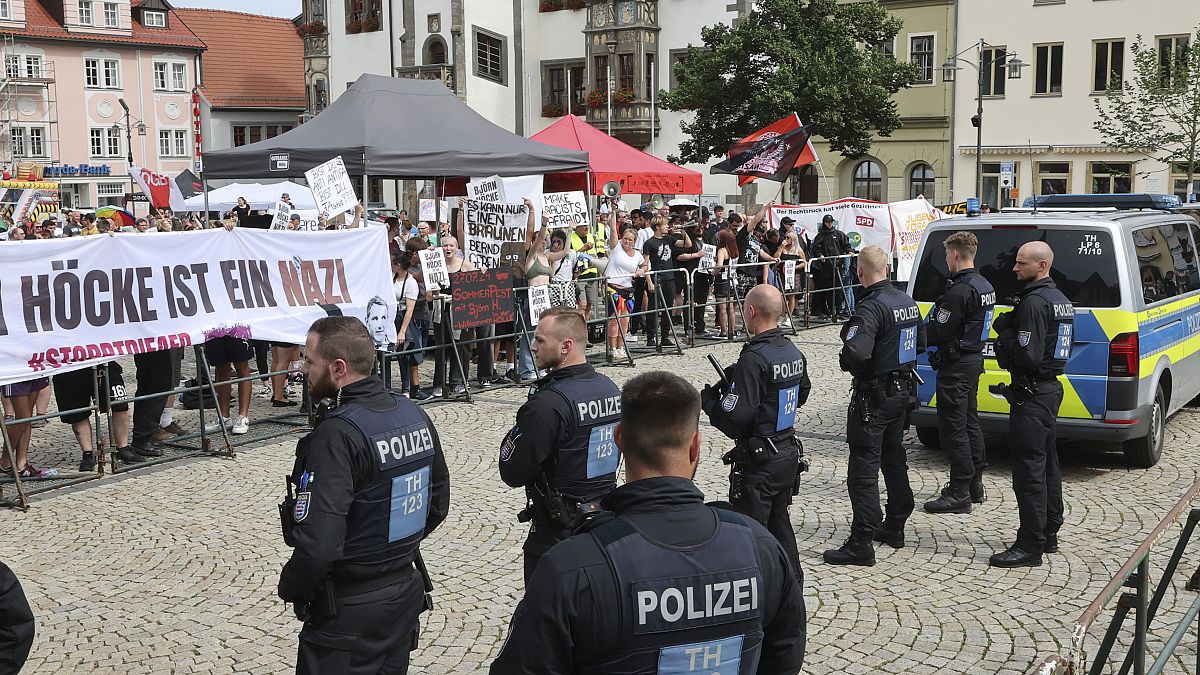Thuringia, a state in Germany known for being a stronghold of the far-right AfD party, is currently at the center of political debate as the upcoming parliamentary elections loom. Recent polls suggest that the AfD could become the second strongest party in the state’s parliament, sparking concern among anti-far right protesters who took to the streets of Erfurt, the state’s capital, in protest on Sunday. The director of the Buchenwald memorial, Jens-Christian Wagner, expressed frustration at the support the AfD has garnered in Thuringia, despite efforts to educate the public about the party’s history. Buchenwald, a labor death camp run by the far-right Nazi party during World War Two, serves as a reminder of the dangers of extremist ideologies.
The Christian Democratic Union of Germany (CDU), currently in power in Thuringia in a coalition with the SPD and the Greens, is facing a tough challenge from the AfD in the upcoming elections. Polls by INSA suggest that the CDU is trailing the AfD by two percent, a worrying prospect for the ruling party. The recent arrest of a failed Syrian asylum seeker in connection with a deadly stabbing in Solingen has further fueled support for the far-right, potentially increasing the AfD’s chances of success in the elections. The political landscape in Thuringia is indicative of a larger trend in German politics, with state elections in Saxony and Brandenburg also scheduled for September, and all eyes on the influence these results will have on national politics.
The upcoming elections in Thuringia, Saxony, and Brandenburg are not only significant on a regional level but also have implications for national politics in Germany. Despite efforts to combat the rise of far-right extremism, the AfD continues to gain support, posing a challenge to mainstream parties like the CDU. The recent events in Thuringia, including the protests in Erfurt and the rise of the AfD in the polls, highlight the growing divide among voters and the increasing influence of populist ideologies in German politics. As the political landscape evolves, it is crucial for parties to address the concerns of the public and work towards fostering unity and inclusivity in society.
The protests in Erfurt, with over 4,000 anti-far right protesters taking to the streets, reflect the growing tensions in Thuringian society over the rise of the AfD. The director of the Buchenwald memorial’s comments underscore the need for continued efforts to educate the public about the dangers of extremist ideologies and the importance of historical awareness. As Thuringia gears up for the upcoming elections, the political climate remains tense, with the AfD poised to make significant gains. The outcome of the elections in Thuringia, Saxony, and Brandenburg will not only shape the future of these states but also have far-reaching consequences for the entire country.
The current political situation in Thuringia, with the AfD gaining ground and mainstream parties facing challenges, calls for a united effort to combat the rise of far-right extremism. The results of the upcoming elections in Thuringia, Saxony, and Brandenburg will provide valuable insights into the shifting dynamics of German politics and the growing influence of populist ideologies. As voters prepare to cast their ballots, it is essential to reflect on the lessons of history and make informed decisions that promote democracy, tolerance, and social cohesion. The events unfolding in Thuringia serve as a reminder of the fragility of democracy and the need to safeguard it against threats from extremist groups and divisive forces. As the elections draw near, all eyes are on Thuringia and its neighbors, as the outcomes will reverberate across Germany and beyond.










